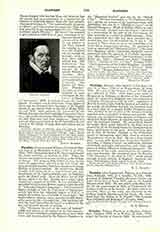

Plowden, FRANCIS, son of William Plowden of Plowden Hall, b. at Shropshire, June 8, 1749; d. at Paris, January 4, 1819. He was educated at St. Omer’s and entered the Jesuit novitiate at Watten in 1766. When the Society was suppressed, he was teaching at the College at Bruges. Not being in Holy Orders he was, by the terms of suppression, relieved of his first vows, and soon afterwards married Dorothea, daughter of George Phillips of Carnarvonshire. He entered the Middle Temple and practiced as a conveyancer, the only department of the legal profession open to Catholics under the Penal Laws. After the Relief Act of 1791 he was called to the Bar. His first great work, “Jura Anglorum”, appeared in 1792. It was attacked in a pamphlet by his brother Robert, a priest under the title of “A Roman Catholic Clergyman”. The book was so highly thought of that the University of Oxford presented him with the honorary Degree of D.C.L., a unique distinction for a Catholic of those days. His improvidence, extreme views, and untractable disposition made his life a troubled one. Having fallen out with the Lord Chancellor, he ceased to practice at the bar and devoted himself to writing.
His “Historical Review of the state of Ireland” (1803) was written at the request of the Government; but it was too outspoken a condemnation to meet their views, and was attacked by Sir Richard Musgrave in the “Historical Review” and also by the “British Critic”. Plowden answered by a “Postliminious Preface“, giving an account of his communications with Addington, and also by a “Historical Letter” to Sir Richard Musgrave. While in Dublin (1811), he published his work “Ireland since the Union”, which led to a prosecution on the part of the Government for libel, resulting in a verdict of £5000 damages. Plow-den considered that this had been awarded by a packed jury and was determined not to pay it. He escaped to Paris where he spent the remaining years of his life in comparative poverty. He continued to write at intervals, his “Historical Letters” to Sir John Cox Hippisley (1815) containing important matter connected with the question of Catholic emancipation. His other works are: “The Case Stated” (Cath. Relief Act, 1791); “Church and State” (London, 1795); “Treatise on Law of Usury” (London, 1796); “The Constitution of the United Kingdom” (London, 1802); “Historical Letter to Rev. C. O’Conor” (Dublin, 1812); “Human Subornation” (Paris, 1824).
BERNARD WARD

